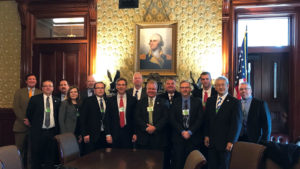In January 2018 members of the Geosynthetic Materials Association (GMA) participated in the Transportation Research Board (TRB) Annual Meeting in Washington, D.C. In February our executive council met in Charlotte, North Carolina, to review GMA’s goals and mission. In March a delegation of GMA executives met with representatives from the White House and the U.S. Department of Transportation to discuss the innovative and transformative role geosynthetics will play in rebuilding the nation. In April GMA hosted the seminar “Waste Containment System Design” in Syracuse, New York. In May GMA members gathered for the association’s spring Lobby Day in Washington, D.C., and in June GMA will be attending infrastructure meetings in Washington, D.C. The first half of the year was jam-packed with exciting developments, and the future looks bright for GMA and the industry.
Executive council meets in Charlotte, North Carolina
GMA hosted its biannual all-day executive council meeting at HUESKER’s headquarters in Charlotte on February 20. The meeting was attended by all fourteen members of GMA’s executive council (representing Owens Corning, SKAPS, TenCate Geosynthetics, Thrace-LINQ, Tensar International Corp., HUESKER, TRI Environmental, Berry Global, Hanes Geo Components, WINFAB, Strata Systems Inc., Propex, GSE/Solmax and Dalco Nonwovens). Special guests included Tom Worrall of our lobbying firm Whitmer & Worrall and former GMA chair Boyd Ramsey. During the meeting, GMA leaders discussed President Donald Trump’s infrastructure proposal, reviewed the impact of GMA’s federal and state government relations program, looked at upcoming conferences, examined focus group initiatives, and considered ways to better promote the industry through GMA and external partnership opportunities.
The executive council is the lifeblood of our organization, and I thank each member for participating in the meeting and supporting our association.

GMA meets with White House to discuss infrastructure a second time
On Tuesday, March 15, 2018, GMA met with White House senior staff to discuss President Trump’s “Legislative Outline for Rebuilding Infrastructure in America.” The leaders of GMA’s executive council emphasized the innovative and transformative benefits of geosynthetic products and the role geosynthetics can play in helping the administration achieve the president’s goals of reducing project time lines, lowering overall costs and increasing the life span of our nation’s infrastructure. The meeting was a follow-up to preliminary meetings GMA officers had with Vice President Mike Pence’s office and the White House Council on Environmental Quality on Sept. 18, 2017.
The president’s infrastructure plan has challenged Congress to fund infrastructure in new ways and close the funding gaps created by limited resources at the federal and state levels. The use of geosynthetic products speeds up project delivery, reduces maintenance costs, decreases life-cycle costs for new projects and protects the environment, qualities which complement the administration’s goals. It is time for our industry to band together to increase awareness of these benefits within all levels of government.
Dalco Nonwovens joins the GMA executive council
Dalco Nonwovens has been a member of GMA since 2006, and I am pleased to announce that the company joined the GMA executive council in March 2018. Dalco Nonwovens is a leading manufacturer and supplier of nonwoven fabrics for a wide range of textile categories, including geotextiles. Dalco has numerous geotextile products for filtration, stabilization and reinforcement for roads, landscaping, erosion control, separation and drainage. Dalco’s representative on the executive council will be GMA chair Keith Gardner.
Durham named chair of Environmental Focus Group
Gardner appointed Andy Durham of Owens Corning to fill the position of chair of GMA’s Environmental Focus Group. Durham is succeeding Bill Betke of GSE/Solmax. During Betke’s time as chair, GMA succeeded in advocating to include geosynthetic language in the 2016 Water Resources Development Act (WRDA) and the 2016 Water Infrastructure Improvements for the Nation (WIIN) Act.
Durham has laid out an aggressive agenda for the Environmental Focus Group for the year, including review of coal combustion residuals (CCR) regulations, outreach to government agencies such as the U.S. Environmental Protection Agency, U.S. Department of Energy, Nuclear Regulatory Commission, and other federal and state agencies. Please reach out to me at jicurry@ifai.com if you are interested in joining a focus group.
 TEXTILES.ORG
TEXTILES.ORG


